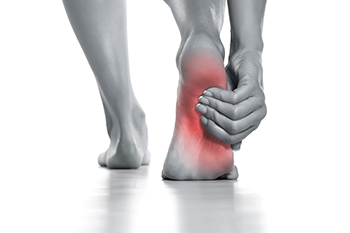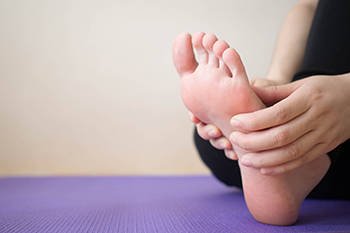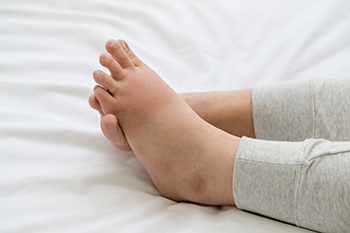

Heel pain is a common ailment that can disrupt daily life and activities. One of the primary culprits is plantar fasciitis, which occurs when the thick band of tissue known as the plantar fascia becomes inflamed or irritated. The plantar fascia is found on the bottom of the foot, and connects the heel to the toes. Plantar fasciitis often results from overuse, wearing improper footwear, or a sudden increase in physical activity. Another common cause of heel pain is Achilles tendonitis, which affects the Achilles tendon at the back of the heel, usually as a result of excessive strain or overuse. To alleviate heel pain, it is beneficial to rest and elevate the affected foot. Wearing proper footwear with adequate arch support can significantly help, in addition to wearing custom orthotic inserts. Performing stretching exercises for the calf muscles and Achilles tendon also can aid in recovery. In severe cases, surgical intervention may be necessary. If you are experiencing heel pain, it is strongly suggested that you make an appointment with a podiatrist who can determine the cause and offer treatment options that are right for you.
Many people suffer from bouts of heel pain. For more information, contact Dr. Todd Goldberg of Complete Family Foot Care Center. Our doctor can provide the care you need to keep you pain-free and on your feet.
Causes of Heel Pain
Heel pain is often associated with plantar fasciitis. The plantar fascia is a band of tissues that extends along the bottom of the foot. A rip or tear in this ligament can cause inflammation of the tissue.
Achilles tendonitis is another cause of heel pain. Inflammation of the Achilles tendon will cause pain from fractures and muscle tearing. Lack of flexibility is also another symptom.
Heel spurs are another cause of pain. When the tissues of the plantar fascia undergo a great deal of stress, it can lead to ligament separation from the heel bone, causing heel spurs.
Why Might Heel Pain Occur?
Treatments
Heel pain should be treated as soon as possible for immediate results. Keeping your feet in a stress-free environment will help. If you suffer from Achilles tendonitis or plantar fasciitis, applying ice will reduce the swelling. Stretching before an exercise like running will help the muscles. Using all these tips will help make heel pain a condition of the past.
If you have any questions please contact our office located in Littlestown, PA . We offer the newest diagnostic and treatment technologies for all your foot and ankle needs.

Plantar fibromas are small lumps that develop in the sole of the foot and can cause foot arch pain in some cases. Treatment aims to reduce pressure on the nodule and alleviate pain. Treatment options include observation if the fibroma is not causing significant pain and non-surgical treatments like exercises. Other options are corticosteroid injections, shoe orthotics if the pain is mild to moderate, and surgery if the pain is severe and non-responsive to non-surgical methods. Exercises focus on stretching and strengthening the plantar fascia and surrounding tissues, to reduce tension on the fibroma. Corticosteroid injections can provide immediate pain relief and reduce the size of the nodule. Orthotics help relieve pressure on the nodules, although custom orthotics may be needed for larger nodules. Physical therapy may include ultrasound or shockwave therapy to reduce the size of the nodules, and radiotherapy can stabilize and shrink fibromas. Surgery is considered a last resort and involves removing the fibroma along with a portion of the plantar fascia. Recovery from plantar fibromas can take 6 to 12 months, during which modifications to activities and foot care are essential. If you think you have a plantar fibroma, it is suggested that you make an appointment with a podiatrist. Other conditions can cause similar symptoms, so proper diagnosis is important and then the most suitable treatment can be recommended.
A plantar fibroma may disrupt your daily activities. If you have any concerns, contact Dr. Todd Goldberg of Complete Family Foot Care Center. Our doctor can provide the care you need to keep you pain-free and on your feet.
Plantar Fibroma
A plantar fibroma is a fibrous knot in the arch of the foot. It is embedded in the plantar fascia which is a band of tissue that extends from the heel to the toes along the bottom of the foot. There can be multiple plantar fibromas in the feet at the same time. There are no known causes for this condition. If you have a plantar fibroma, there will be a bump in the arch of your foot that cannot be missed. Any associated pain is most often due to a shoe rubbing against the nodule. Non-surgical options, such as steroid injections, physical therapy, and orthotics should be tried first. Surgery is a last resort and is the only thing that will remove a plantar fibroma entirely. Consult with a podiatrist for a proper diagnosis and to determine the treatment regimen that is right for you.
What Causes a Plantar Fibroma?
While there are no specific causes identified, a plantar fibroma can possibly come from genetic predisposition or the formation of scar tissue that forms from healing the tears in the plantar fascia.
What Are the Symptoms of a Plantar Fibroma?
There will be a noticeable lump in the arch of the foot that may or may not cause pain. If pain is felt, it is typically because a shoe is rubbing up against the lump or when walking or standing barefoot.
Treatment and Prevention
A plantar fibroma will not disappear without treatment, but it can get smaller and be a non-issue. If pain persists, a podiatrist examines the foot and when the arch of the foot is pressed, pain can be felt down to the toes. An MRI or biopsy might be performed to help diagnose or evaluate the plantar fibroma. The following non-surgical options are generally enough to reduce the size and pain of these nodules:
Surgery is considered if the mass increases in size and the patient continues to feel pain after non-surgical methods are tried.
If you have any questions please feel free to contact our office located in Littlestown, PA . We offer the newest diagnostic tools and technology to treat your foot and ankle needs.

Edema, the swelling or puffiness of body parts, can be a common discomfort during pregnancy. It typically affects the feet, ankles, and legs. This condition can also result in discomfort, potentially limiting the range of motion in your ankles. Edema occurs when excess fluid accumulates in the body's tissues. Several factors can contribute to this buildup, including gravity, diet, medication, and certain medical conditions. Fluid is naturally pulled down into your legs and feet, and sitting or standing for prolonged periods, especially in hot weather, can make swelling worse. Excessive amounts of salt can lead to fluid retention. Edema is not contagious, nor does it have a genetic predisposition. Regular exercise, such as walking, can aid in reducing edema by working the calf muscles, which assist in fluid circulation. It is also a good idea to elevate your legs as often as possible and wear some type of compression socks. Edema during pregnancy is a common occurrence, but it can be managed with lifestyle modifications and medical intervention. For more information on edema in the feet and ankles, it is suggested that you make an appointment with a podiatrist.
Pregnant women with swollen feet can be treated with a variety of different methods that are readily available. For more information about other cures for swollen feet during pregnancy, consult with Dr. Todd Goldberg from Complete Family Foot Care Center. Our doctor will attend to all of your foot and ankle needs.
What Foot Problems Can Arise During Pregnancy?
One problem that can occur is overpronation, which occurs when the arch of the foot flattens and tends to roll inward. This can cause pain and discomfort in your heels while you’re walking or even just standing up, trying to support your baby.
Another problem is edema, or swelling in the extremities. This often affects the feet during pregnancy but tends to occur in the later stages.
How Can I Keep My Feet Healthy During Pregnancy?
If you have any questions please feel free to contact our office located in Littlestown, PA . We offer the newest diagnostic and treatment technologies for all your foot and ankle needs.

Pain in the arch of the foot can affect daily activities and cause discomfort. A common cause of arch pain is plantar fasciitis, which often occurs due to flat feet. This condition involves the overstretching of the plantar fascia, leading to morning pain and discomfort in the heel. Stress fractures are another typical source of arch pain, arising from repetitive force, especially in high-impact activities. Flat feet, or fallen arches, can contribute to arch pain as well. When the arches collapse while walking or standing, it can cause discomfort. Managing this condition involves shoe adjustments, using inserts, and incorporating periods of rest. Posterior tibial tendonitis is another cause of arch pain. It results from overuse of the tibialis posterior muscle, particularly after extended periods of standing. Treatment options include rest, specific exercises, and the use of compression. Foot cramps can also lead to arch pain. Wearing ill-fitting shoes that lack arch support is another contributor to arch pain. Underlying medical conditions like arthritis, diabetes, and obesity can weaken bones and tendons, leading to arch pain. If you suffer from pain in the arches of the feet, it is suggested that you make an appointment with a podiatrist for diagnosis and treatment.
Foot Pain
Foot pain can be extremely painful and debilitating. If you have a foot pain, consult with Dr. Todd Goldberg from Complete Family Foot Care Center. Our doctor will assess your condition and provide you with quality foot and ankle treatment.
Causes
Foot pain is a very broad condition that could be caused by one or more ailments. The most common include:
Diagnosis
To figure out the cause of foot pain, podiatrists utilize several different methods. This can range from simple visual inspections and sensation tests to X-rays and MRI scans. Prior medical history, family medical history, and any recent physical traumatic events will all be taken into consideration for a proper diagnosis.
Treatment
Treatment depends upon the cause of the foot pain. Whether it is resting, staying off the foot, or having surgery; podiatrists have a number of treatment options available for foot pain.
If you have any questions, please feel free to contact our office located in Littlestown, PA . We offer the newest diagnostic and treatment technologies for all your foot care needs.